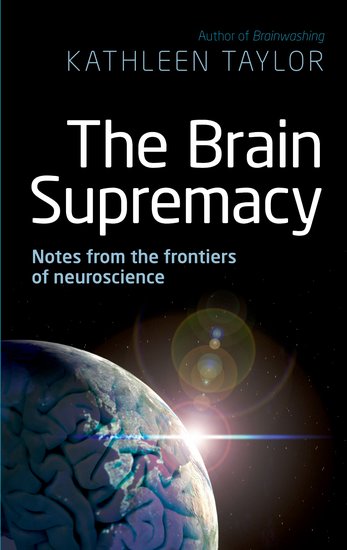The Sunday Times Oxford Literary Festival 2013 is in full swing, welcoming thinkers and writers from across the globe to our wonderful city of Oxford. We’re delighted to have over thirty Oxford University Press authors participating in the Festival this year! OUPblog will be bringing you a selection of blog posts from these authors so that even if you can’t join us in Oxford this year, you won’t miss out on all the action. Don’t forget you can also follow @oxfordlitfest and check the event schedule here.Kathleen Taylor will be appearing at the Oxford Literary Festival on Saturday 23 March 2013 at 2pm to discuss what the new science of the brain supremacy means for us. More information and tickets.
Q&A with Kathleen Taylor
What is the brain supremacy?
I use the phrase ‘the brain supremacy’ to describe the increasing relevance of neuroscience. It foresees an era – whose birth is already well underway – when the balance of power within the sciences will shift from the natural to the life sciences, from physics and chemistry to the fast-moving sciences of the mind and brain. Neuroscience used to be a subfield of human physiology. It is now a fully-fledged research discipline, and its influence in everyday life is only beginning to be felt. As the era of the brain supremacy unfolds, it will change us in ways unmatched by any science outside the realms of science fiction.
The brain supremacy has been gathering pace for a while. It is driven by the convergence of three great technological advances: in computing power, in genetics, and in neuroimaging. Computing provides the ability to record, store and process the vast amounts of data generated by an organ made up of some 170 billion electrically-signalling neurons and glial cells. Genetics offers the promise of precise manipulation of those cells, switching genes on and off on demand, and controlling the activity of the proteins they encode with unprecedented accuracy. And neuroimaging has opened up the black box between the brain’s sensory inputs and its motor outputs, allowing researchers to study living human brains as they process and react to incoming data.
Why does the brain supremacy matter to you?
A change within science which pushes brain research up the status hierarchy may not seem important to anyone except scientists, but it is. The ways we respond to science, our expectations of its capabilities, our moral judgements of its achievements and our fears about it, all are shaped by ideas which have, so far, come primarily from the natural sciences. Think of a scientist, and chances are it’s Einstein or Newton who springs to mind – not Darwin, let alone a neuroscientist. Yet it is the neuroscientists who are likely to have the greatest impact on us in the 21st century.
Why? Because in the brain supremacy, the material which researchers analyse and manipulate is not inanimate matter, nor even the living organisms used in animal research. The stuff of these new sciences is us, and that changes everything. The ability to understand and control a human brain, once we possess it, opens up extraordinary possibilities. Neuroscience is by no means there yet, but it has made extraordinary progress even in the last ten years. Yet the ethics of studying people, which ultimately come from medicine, are not the same as the traditional scientific ethics of studying material. We cannot simply react to brain research as we would to any other science, because its implications for human nature are so profound.
What new technologies will the brain supremacy provide?
I use the term ‘digitised neural experience’ (DNE) to cover all digitally-recorded measures of brain activity, and to make the point that brain activity has much to do with minds. (Change one, and you can change the other, even though we do not fully grasp the nature of the link between them.) There are two kinds of future DNE technologies: recording and programming. Once these are developed, they will give us the power, among other things, to lessen or heal the damage done by brain diseases, to record and share dreams, to achieve practical telepathy, and to reshape not only our bodies – as we do already – but our feelings, beliefs and personalities. What we now manage slowly or not at all, with education, experience and self-discipline, will be attainable much more quickly by technological means.
But isn’t this pure speculation?
The answer is: we don’t know. We do know that brain research has a long way to go before it is able to manipulate DNE as precisely as we would like. There are many difficulties in the way of precision thought control, and there may yet be some obstacle which proves fatal to the entire DNE enterprise. Ethical objections are easy to imagine, but given the attractions of DNE technologies, it is less easy to see how moral qualms will stymie their development. So by ‘obstacle’, I mean some scientific or technological limitation which stalls research progress.
At present, we know of no such limitation. We also know that ideas which, two decades ago, would have been derided as impossible are now being calmly considered in the research literature. For example, neuroimaging researchers have already begun to decode brain activity patterns, allowing them to know which image a person is looking at, or where an animal is in a virtual environment, simply by analysing brain data. Work is also being done on linking brain activity patterns to specific words, and to movements. This is the basis of ‘thought-controlled’ games, wheelchairs, and artificial limbs, which are already being made available to the public.
Why did you write ‘The Brain Supremacy’?
Neuroscience is the most fascinating science on the planet, because it is the science of us. Brains are not only amazingly complex organs in their own right, they are the physical ground of everything we cherish most. In this century, we may well achieve the capacities of DNE recording and programming, allowing us to manipulate living human brains with unprecedented ease and precision. That prospect is glorious, but, as so often with new science, it is also double-sided. There are the hopes of self-improvement and of healing dreadful brain disorders … and then there are the less pleasant uses of DNE control. Governments, the military and corporations are intensely interested in neuroscience. It isn’t hard to see why.
To ensure that we get the best from the new science, while restraining its darker side, we need much more public interest and involvement. Thus The Brain Supremacy expresses a sense of urgency, a need to catch up with the research. We need to talk about neuroscience, and to do that we need a guide to its cutting edge, and to the methods which will drive the brain supremacy.
Kathleen Taylor has written on a range of topics from consciousness to cruelty. Her most recent work, The Brain Supremacy: Notes from the frontiers of neuroscience, published in 2012.
Subscribe to the OUPblog via email or RSS.
Subscribe to only psychology articles on the OUPblog via email or RSS.






Recent Comments
There are currently no comments.